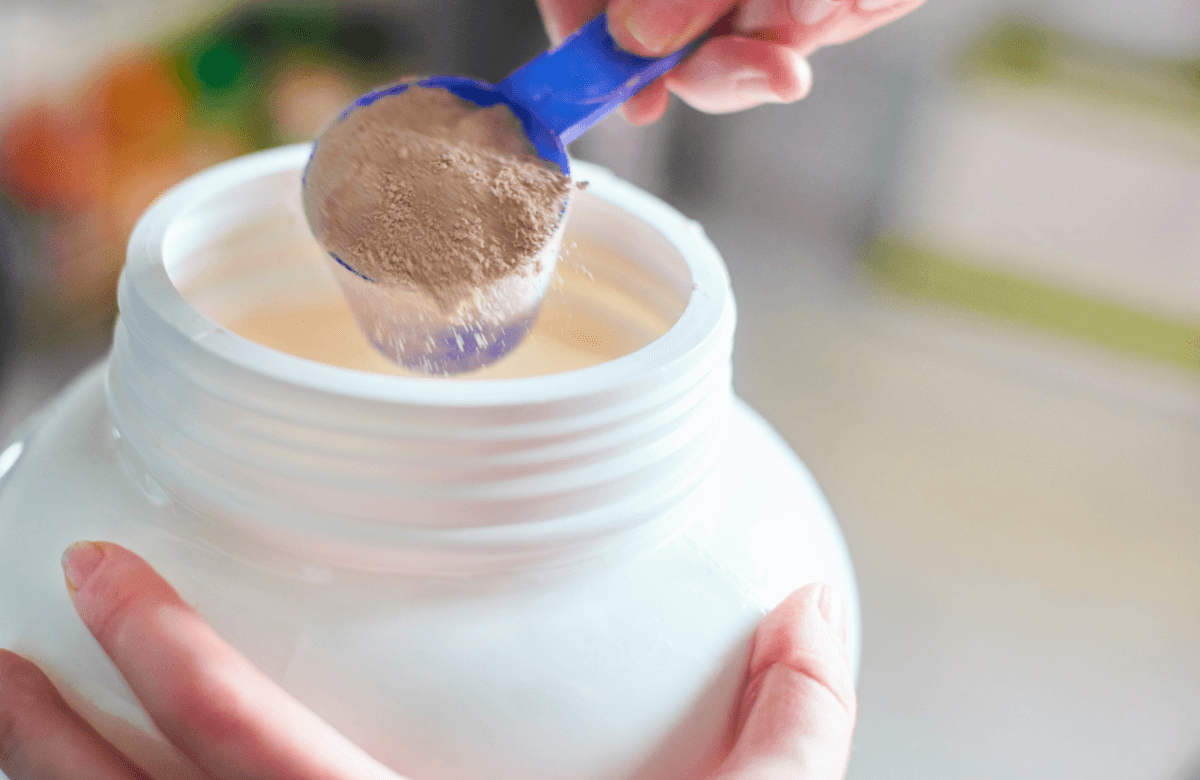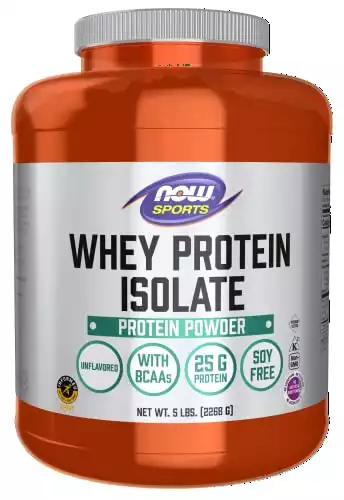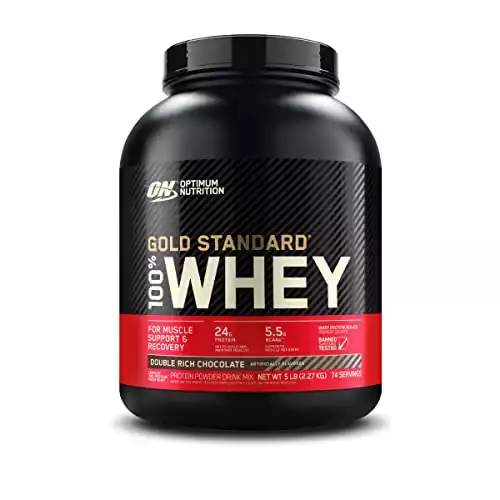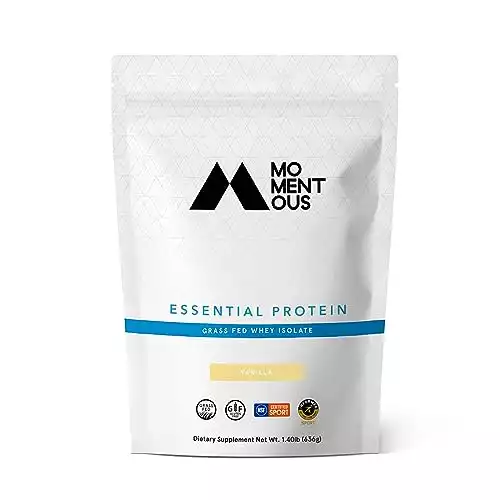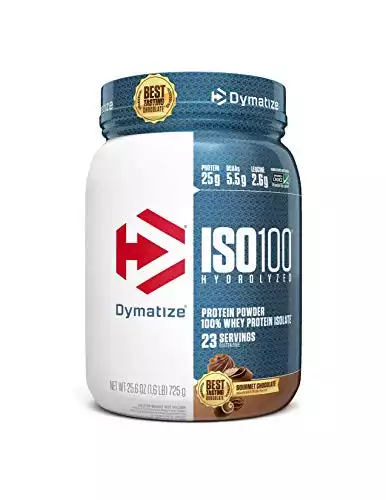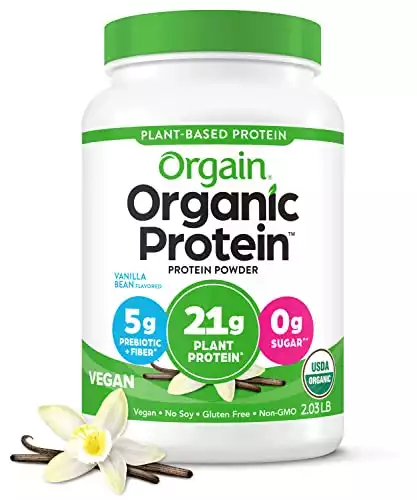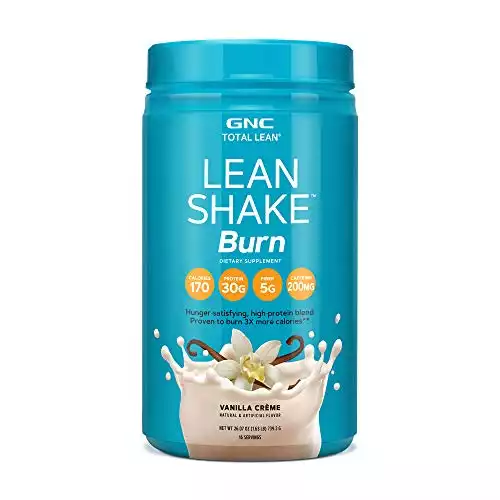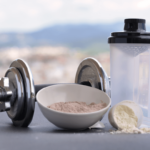You can’t deny the integral part that proper dietary and lifestyle choices play in our overall health. Protein is an essential macronutrient for our body’s functioning, repairing, growing new cells, and providing us with the energy we need for our daily activities. While the basic protein intake requirements are the same for everyone, depending on your physical activity and circumstances, additional protein-rich foods can be beneficial.
As such, whey protein powders have taken center stage in the supplement world thanks to their ingredient quality, taste, and convenience. They’re basically a concentrated form of cow’s milk that has been processed to remove unhealthy fats and lactose while retaining the beneficial proteins that are essential for muscle growth. Their unique composition brings a plethora of health benefits, such as improved metabolism and immunity, all while supporting muscle growth.
Jump to:
- In a Hurry ? Here are our best ranked products
- Why You Should Trust Us
- Who Is This Guide For?
- How We Picked the Best Products
- How We Graded Each Product
- The Products
- Now Sports Nutrition Whey Protein Isolate – Best Overall
- Optimum Nutrition Gold Standard Whey – Best for Gluten-Free Diet
- GNC Total Lean Shake Burn – Best for Weight Loss
- Orgain Organic Vegan Protein Powder – Best for Vegans
- Momentous Essential Grass-Fed Whey Protein – Best for Competitive Athletes
- Dymatize ISO100 Hydrolyzed Protein Powder – Most Reasonable Price
- A Step-by-Step Guide to Choosing the Right Whey Protein Powder
- 10 Compelling Benefits of Whey Protein Powder
- Frequently Asked Questions:
In a Hurry ? Here are our best ranked products
| Product Image | Product Name / Primary Rating / Primary Button |
|---|---|
Why You Should Trust Us
At BoxLife, we take great pride in our dedication to fitness and health. We understand the importance of having access to reliable, trustworthy information when faced with such a wide variety of products on the market, each one with its own unique set of benefits. Our team of experts has spent countless hours researching the best whey protein powder options, with scrutinizing attention to detail and a comprehensive list of criteria.
We aim to bring you the most effective options on the market, all curated and tested by our team of experts with years of experience in the field. We know how our readers’ dietary needs vary, and how crucial it is to select the product that best suits each individual. Thanks to our thorough research and rigorous testing, you can trust our recommendations and make the best choice for your well-being. We know which high-quality ingredients bring more benefits and which ones are best avoided, and we’ve made sure to include them in our list.
Who Is This Guide For?
If your current dietary supplement or gym routine doesn’t seem to fit you anymore and you feel like you need something more, you can certainly benefit from switching to a whey protein powder. This guide is suitable for anyone who wants to incorporate this product into their daily routine in order to improve their physical performance, support muscle growth, and reduce muscle fatigue. Their undeniable convenience and wealth of health benefits make these products an excellent choice for people with active lifestyles, athletes, and bodybuilders.
How We Picked the Best Products
Our critical lens for evaluating and selecting the most useful products was only a single aspect of our multi-step process. We conducted extensive research across the internet to get an all-encompassing view of each product and how well it performed in different categories. We looked at lengthy discussion threads across Reddit and Quora, with the goal of reaching a consensus from real users across different demographics. Their uncensored opinions represented the most accurate view of each product’s features and efficacy.
We also examined consumer reviews across Amazon, Titan and Rogue Fitness, where a more focused and in-depth conversation about product features took place. This helped us to further refine our choices and focus on products that met our criteria. Each comment offered invaluable insight into what the product was like in real-life scenarios, as well as what users actually thought of it. Some had more positive reviews than others, and this allowed us to make a more informed decision.
How We Graded Each Product
Once we had a shortlist of the best whey protein powder contenders, we had to evaluate them across equal criteria. Since our goal was to create a comprehensive guide of the highest quality products, we had to ensure each option met certain standards and specifications.
- Form of Protein – There are three basic forms of whey protein: concentrate, isolate and hydrolysate. The first option is the least processed and consists of proteins that are easier to digest. Isolate offers a higher concentration of protein with fewer carbohydrates and fats, which inherently brings more benefits to the table. Lastly, hydrolysate is the most processed form and offers maximum bioavailability but may also have a higher cost.
- Texture – Many products offer a gritty, chalky texture that can be off-putting for some people, which is more of a subjective than objective criteria. We focused on products that provided a smooth, creamy texture and easy mixing with minimal foam or froth. This is because the smoother the texture, the easier it is for your body to absorb the proteins. When they’re taken in easily, the nutrients can be used more efficiently.
- Calories Per Scoop – Protein is undoubtedly a dense form of energy, and we considered products that provided fewer calories per scoop. The density of the supplement would signal the quality of the ingredients, as well as its ability to provide sufficient nutrition while preserving a healthy diet. In an ideal scenario, there should be at least 25 grams of protein per scoop and 100 or fewer calories. This combination will help you stay fit and healthy without compromising your diet.
- Dietary Restrictions – Depending on your dietary needs, you may be looking for a product that is gluten-free, vegan, or low in sugar. We looked at the label of each product and made sure to note any potential allergens, as well as other elements that might be undesirable for some people. While this doesn’t necessarily mean you should avoid consuming it, these details show how well the product is formulated and what kind of nutritional value it brings to the table.
- Product Quality – We looked at the overall quality of the ingredients used in each product. This involves analyzing their composition, as well as how they were processed and packaged. High-quality ingredients don’t just provide better nutrition, they often taste better and are easier to consume. When you have a product that meets all of these criteria, you’re more likely to enjoy the benefits it brings.
The Products
When our preliminary research was complete, we were able to compile our list of the best whey protein powders on the market. We selected a handful of products that seemingly offered the most benefits and were rated highly amongst users. Let’s take a look at each product in more detail:
Now Sports Nutrition Whey Protein Isolate – Best Overall
Offers an all-around winning combination
- No additives to compromise the quality
- A quality blend of proteins for maximum efficacy
- May leave behind a sour aftertaste
Packed with nutritional goodness and an overall high-quality formulation, the Now Sports Nutrition Whey Protein Isolate brings unparalleled convenience and benefits to the table. It’s made from premium quality whey protein isolate, which is known for its higher concentration of proteins with fewer carbohydrates and fats. It acts quickly on the muscles and supports muscle growth, as well as reducing fatigue after a workout. It doesn’t contain any artificial flavors, sweeteners, or preservatives and is cold-processed to ensure maximum potency.
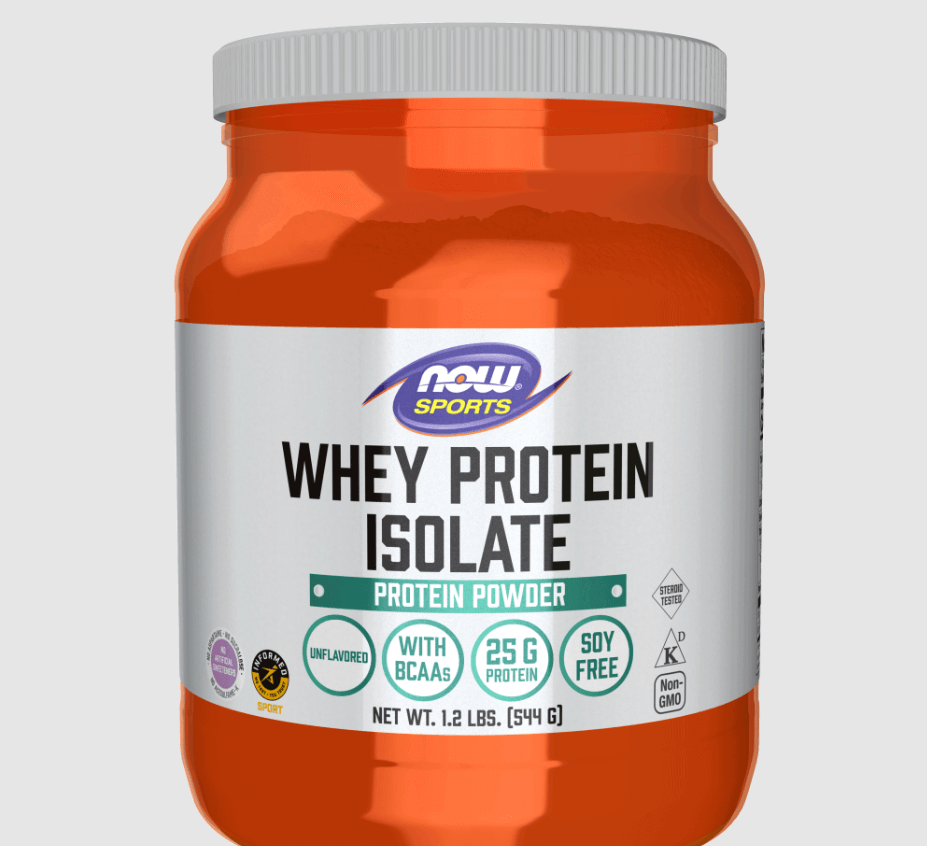
Pros
- No additives to compromise the quality
- A quality blend of proteins for maximum efficacy
- Intensely potent and fast-acting formula
- Excellent value for money due to low-calorie count
Cons
- May leave behind a sour aftertaste
- Some packs might miss a scoop
Key Specs
| Protein Source | Whey Protein Isolate |
| Flavors | Unflavored |
| Calories Per Scoop | 110 |
| Protein Per Serving | 25g |
Why It’s Great
As far as unflavored protein powders go, the Now Sports Nutrition Whey Protein Isolate offers an all-around winning combination. Its high concentration of proteins and low-calorie count have an incredibly positive effect on the body. It helps build muscle and reduce fatigue after exercise, with a slow and gradual release that keeps you feeling energized all day.
Plus, its lack of additives and preservatives ensures a quality performance with every scoop. It doesn’t contain any sugar, trans fat, or cholesterol that can potentially have a negative effect on your health. Its entirely natural ingredients and carefully processed formula result in a product that’s incredibly beneficial for active individuals.
As far as texture goes, this protein powder is incredibly smooth and mixes easily into liquids. This makes it incredibly easy to consume and enjoy its benefits without having to deal with clumps or lumps during your shake. It doesn’t take long to mix and there’s minimal foam or froth. This makes it a winning choice for anyone who wants an effortless drinking experience with maximum potency.
Who It’s Best For
If you don’t like flavors or sweeteners in your shake then the Now Sports Nutrition Whey Protein Isolate can be a fantastic middle ground with plenty of benefits. It acts quickly on the muscles and can help reduce fatigue after exercise. It has a low-calorie count but still provides plenty of protein for those looking to build muscle or lose weight. Plus, its smooth texture makes it incredibly easy to mix and consume without having to worry about lumps or foam.
Optimum Nutrition Gold Standard Whey – Best for Gluten-Free Diet
If you want to facilitate healthy muscle building and recovery after intense workouts or simply want to maintain a lean and toned physique, then this product is definitely for you.
- Facilitates healthy muscle building in teenagers
- Great for supporting recovery after intense workouts
- Contains traces of soy
- Has artificial sweeteners to improve taste
The protein blend found in the Optimum Nutrition Gold Standard Whey is an interesting yet powerful combination of whey protein concentrate, whey protein isolate, and whey peptides. All three options bring different benefits to the table and work together to provide a highly potent, highly nutritious supplement that takes very little time to take effect. Its gluten-free formula makes it a great choice for those with specific dietary needs, and its natural sweetener blend ensures a delicious and indulgent flavor.
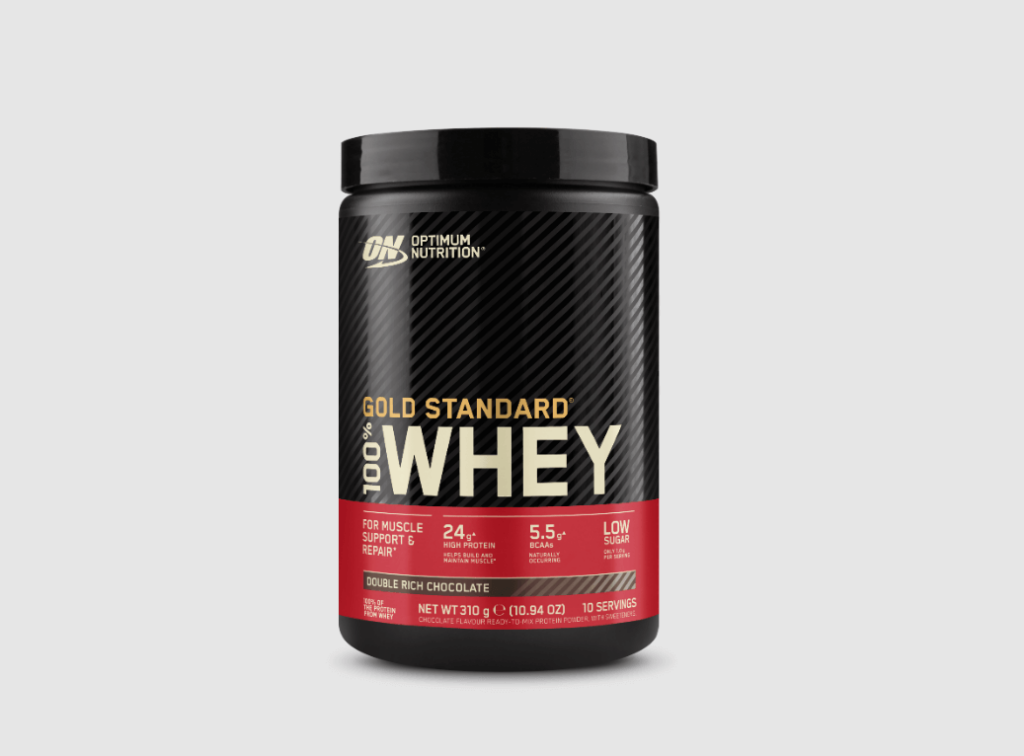
Pros
- The gluten-free formula can be beneficial for people with dietary restrictions
- The highly potent protein blend provides plenty of nutritional value
- Natural sweeteners blended in to give the shake a delicious flavor
- Easy to mix and consume with minimal foam or lumps
Cons
- May contain traces of sucralose
- Some flavors can be overly sweet
Key Specs
| Protein Source | Whey Protein Isolate, Concentrate and Peptides |
| Flavors | 20 |
| Calories Per Scoop | 120 – 130 |
| Protein Per Serving | 24g |
Why It’s Great
The Optimum Nutrition Gold Standard Whey packs a powerful punch when it comes to protein due to its triple-protein blend. It’s incredibly effective in helping build lean muscle and can significantly boost performance during exercise. Both concentrate and isolate varieties are included, acting quickly on the muscles for enhanced recovery and improved strength, while the peptides work by improving absorption and digestion.
Additionally, it’s an excellent option for those who have dietary restrictions due to its gluten-free formulation. This offers a convenient and safe way to get the protein you need without focusing on what you can’t have. Plus, its natural sweetener blend makes it incredibly tasty and indulgent, despite having traces of sucralose in it. While some flavors may have a slight aftertaste, overall it’s still incredibly enjoyable.
Finally, this protein powder is incredibly easy to mix into liquids. Thanks to its low-foam and lump-free texture, it takes very little effort to get the desired consistency in your shake. It doesn’t take long to mix and doesn’t create any mess when blending in a shaker. The vast range of flavors gives you plenty of options when it comes to indulging in the product, from classic chocolate and vanilla to more unique options like cookies and cream or strawberry banana. Both the traditional and modern flavors are delicious and indulgent, with subtle sweetness and intense flavor.
Who It’s Best For
The branched-chain amino acids and gluten-free formulation of the Optimum Nutrition Gold Standard Whey means that it’s quite suitable for those with dietary restrictions. It’s incredibly effective in stimulating muscle growth and performance, and the significant amount of proteins ensures that you get all the nutrition you need. The natural sweeteners also mean that it’s incredibly indulgent and enjoyable, while the variety of flavors gives you plenty of choice when it comes to shake time.
GNC Total Lean Shake Burn – Best for Weight Loss
The extra protein kick from the GNC Total Lean Shake Burn is thanks to its high concentration of the isolate variety. This makes it an incredibly effective supplement for burning fat and helping to build lean muscle. It’s designed to provide a convenient meal replacement option that has enough calories to keep you full but with lower amounts of sugar and carbs. This particular combination results in greater absorption rates and improved performance across the board.
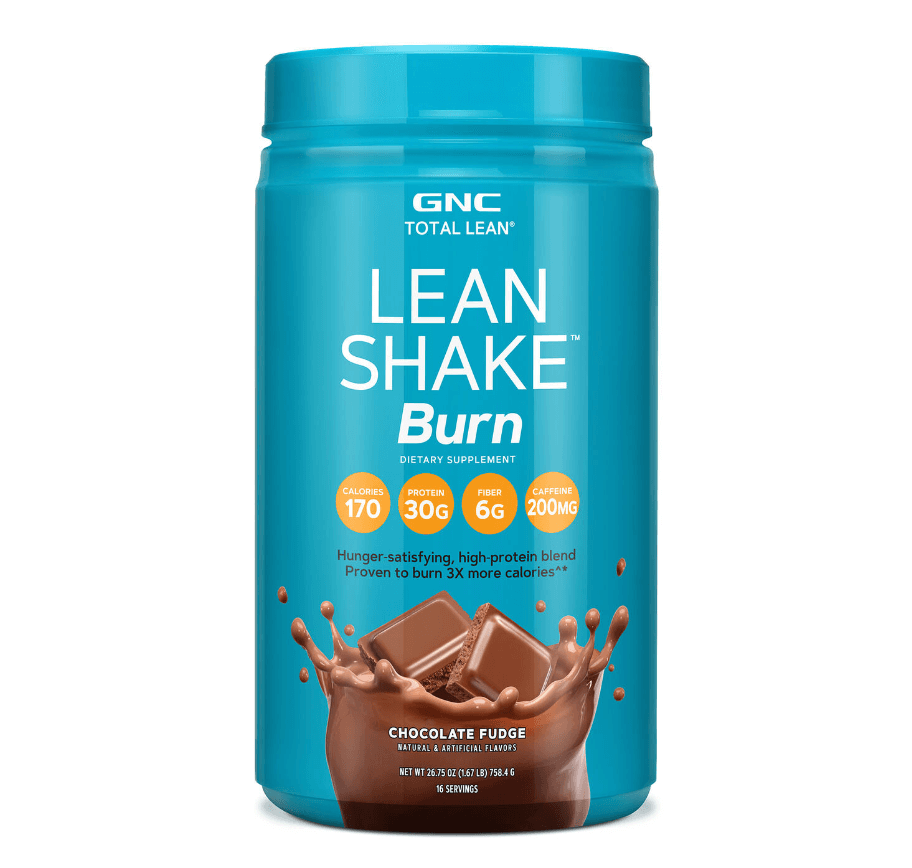
Pros
- High concentration of fast-digesting protein isolate
- Low sugar and carbohydrate content can help with weight loss
- 24 essential vitamins and minerals for improved health
- Natural sweeteners blended in to give the shake a delicious flavor
Cons
- May have a slightly chalky aftertaste
- More expensive than other protein powders
Key Specs
| Protein Source | Whey Protein Isolate |
| Flavors | 3 |
| Calories Per Scoop | 170 |
| Protein Per Serving | 30g |
Why It’s Great
The GNC Total Lean Shake Burn is an incredibly effective supplement for those who want to lose weight or build lean muscle. Its high concentration of fast-digesting protein isolate means that it’s incredibly efficient in promoting the burning of fat and muscle retention. It acts by providing the body with a steady supply of necessary nutrients to ensure greater absorption rates and boosted energy levels. This is largely due to its low sugar and carbohydrate content, which ensures that you don’t load up on empty calories.
This protein powder also provides a convenient meal replacement with the right amounts of calories to keep you full and energized throughout the day. The low sugar and carbohydrate content can be incredibly beneficial for weight loss, while its blend of 24 vitamins and minerals ensures that your body gets all the essential nutrients it needs. Plus, its natural sweetener blend makes it incredibly tasty and enjoyable despite having a slightly chalky aftertaste.
Finally, the mixability of this protein powder is quite admirable given its high protein content. It mixes quickly and evenly and doesn’t create much foam or lumps when blended in a shaker. Even though it has only three flavors to choose from, each one is incredibly indulgent and there are plenty of recipes that can be made with it to improve variety. You can add it to smoothies, yogurts, or even hot drinks for a nutritious and delicious snack. It doesn’t take long to mix and doesn’t create any mess when blending in a shaker.
Who It’s Best For
When it comes to powders for weight loss, few come close to the GNC Total Lean Shake Burn. Its high content of fast-digesting protein isolate is incredibly effective in helping you lose weight and tone up, while its natural sweeteners make it incredibly enjoyable. The 24 vitamins and minerals also ensure that your body gets all the nutrients it needs to stay healthy at all times. It brings together the best of convenience and nutrition, with a range of recipes that you can use to increase variety.
Orgain Organic Vegan Protein Powder – Best for Vegans
Incredibly potent supplement for those who want to stay healthy on a more restrictive diet
- Organic and plant-based proteins
- Suitable for anyone with allergies or lactose intolerance
- Hasn't been third-party tested
In terms of organic ingredients and plant-based proteins, there’s no beating the Orgain Organic Vegan Protein Powder. It’s a complete product that has been specially formulated to provide vegans with all the amino acids and vitamins they need to stay healthy and energized, all while delivering a delicious and indulgent flavor. Its potent yet smooth taste is thanks to its natural sweetener blend, while the mixability of this powder is quite impressive.
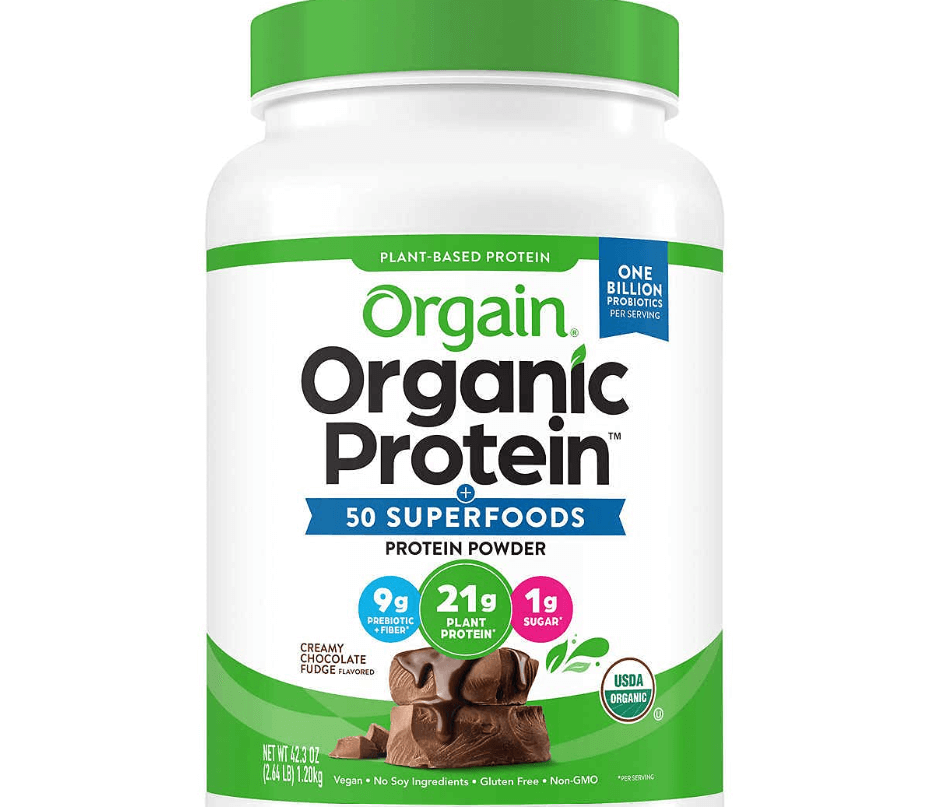
Pros
- Organic and plant-based proteins
- Suitable for anyone with allergies or lactose intolerance
- Low in calories and sugar, ideal for those trying to lose weight
- Natural sweetener blend to create a delicious flavor
Cons
- Hasn’t been third-party tested
- Powder may have a somewhat synthetic taste
Key Specs
| Protein Source | Plant-Based Protein |
| Flavors | 4 |
| Calories Per Scoop | 150 |
| Protein Per Serving | 21g |
Why It’s Great
Harnessing the power of organic ingredients and plant-based proteins, the Orgain Organic Vegan Protein Powder is an incredibly potent supplement for those who want to stay healthy on a more restrictive diet. It’s a complete product that provides all the essential vitamins and amino acids you need to maintain your energy levels. This includes key amino acids like alanine, glycine, and arginine for muscle growth, plus added vitamin D3 for improved bone health and calcium absorption. The former is especially important for vegans as they’re not able to get these essential nutrients from animal sources.
Its blend of natural sweeteners is also quite impressive, creating a potent yet smooth taste that’s incredibly delightful and enjoyable. Its low sugar content and calories bring a balanced yet effective product, while its impressive mixability ensures that it blends quickly and evenly with other ingredients. While it does have a slightly synthetic taste, it’s still incredibly delicious and can easily be masked with the addition of fruits or other flavors.
Moreover, the addition of kosher and gluten-free ingredients also makes it suitable for anyone with allergies or lactose intolerance. The fact that it’s organic and plant-based also means that it is a healthier option than other protein powders on the market, meaning that you can get all the benefits of a vegan diet without sacrificing taste or nutrition. It doesn’t feel overly processed or artificial, with an appealing texture and four different flavors at your disposal.
Who It’s Best For
This plant-based protein powder brings the best of both worlds in terms of nutrition and taste. It’s designed for vegans who want a healthy but indulgent supplement that can provide all the necessary vitamins and amino acids for improved health, while also delivering a delicious and smooth flavor. Its creamy yet mild taste is thanks to its blend of natural sweeteners, while the addition of gluten-free and kosher ingredients delivers a more accessible product for those with allergies or intolerances. It’s certainly a superb choice for anyone who wants to make the switch to a more restrictive diet without sacrificing quality or convenience.
Momentous Essential Grass-Fed Whey Protein – Best for Competitive Athletes
Extremely helpful for competitive athletes
- Proprietary enzyme blend to improve digestion
- Grass-fed whey protein
- Only one flavor available
- Slightly less protein content than other powders
Grass-fed cows actually provide the cleanest source of whey protein, which is why the Momentous Essential Grass-Fed Whey Protein is an incredibly effective supplement for competitive athletes. It provides 11 grams of branched-chain amino acids per serving to help with muscle growth and endurance, including L-glutamine and carbohydrates for greater energy and recovery. It also contains immunoglobulins, which are proteins that help strengthen the immune system.
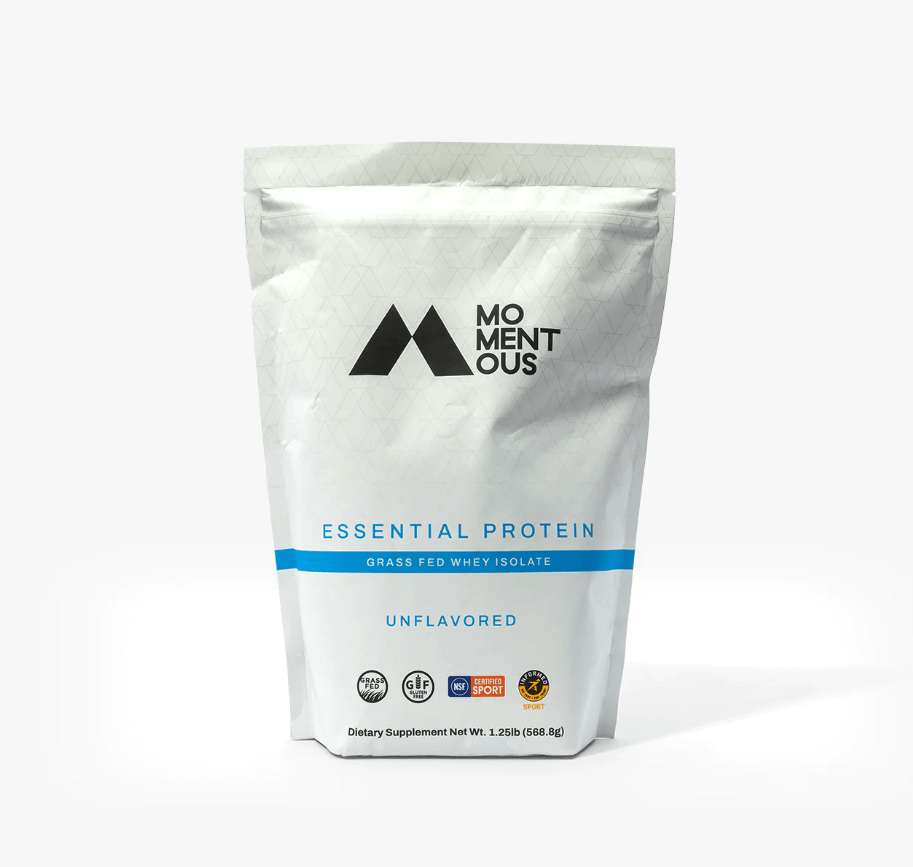
Pros
- Proprietary enzyme blend to improve digestion
- Grass-fed whey protein for the cleanest source of amino acids
- High content of branched-chain amino acids to aid muscle growth and endurance
- Contains immunoglobulins for improved immunity
Cons
- Only one flavor available
- Slightly less protein content than other powders
Key Specs
| Protein Source | Whey Protein Isolate |
| Flavors | 1 |
| Calories Per Scoop | 100 |
| Protein Per Serving | 20g |
Why It’s Great
The way cows are raised can affect the quality of the whey protein they produce since the environment can have an effect on the animal’s diet and health. If they’re fed using grass, they provide a much cleaner source of proteins which can be quite valuable for those looking to bulk up or increase their muscle mass. As such, grazing cattle is the sole ingredient used in many products, which translates into an incredibly effective supplement for athletes. On the other hand, feeding them with grains or supplements can actually lower the quality of the product and hence the effectiveness of it.
That’s why the Momentous Essential Grass-Fed Whey Protein uses only cows that are fed using grass, bringing the best of ingredients and nutrition to your table. Its proprietary enzyme blend helps break down the proteins into easier-to-digest components, while its 11 grams of branched-chain amino acids provide greater muscle growth and endurance. The added immunoglobulins also help strengthen the immune system, meaning that you can train harder for longer without risking your health.
While it doesn’t have a high-density protein content, its quality makes up for that and it still manages to provide an effective supplement. Its single chocolate flavor is admittedly quite basic but the taste is incredibly enjoyable, with a silky texture and a slightly sweet aftertaste. It also mixes incredibly well thanks to the carefully formulated ingredients, which can help you get the most out of your training. It actually works better than regular whey protein when taken before a workout because of its fast-acting qualities.
Who It’s Best For
Any whey protein supplements that are based on grass-fed cows can be extremely helpful for competitive athletes, providing a more targeted and precise source of amino acids that can help build muscle faster. The Momentous Essential Grass-Fed Whey Protein is specifically designed for this purpose, with its blend of essential proteins and botanical enzymes working together to create a potent and useful product, in addition to its singular yet quite decent flavor. It’s certainly not as high in protein content as some other products, but its quality and effectiveness more than makeup for it.
Dymatize ISO100 Hydrolyzed Protein Powder – Most Reasonable Price
This yields a digestible form of protein that's much easier to absorb
- Low in carbohydrates, fat, and sugar
- Hydrolyzed proteins for fast absorption
- Containers may not be full to the brim
- Includes both sucralose and stevia
While a scoop of protein powder brings about a multitude of health benefits, it can be quite expensive for those on a budget. Fortunately, there are more affordable options out there, which are just as effective in delivering your daily intake of this nutrient and other essential ingredients to facilitate muscle growth and energy. The Dymatize ISO100 Hydrolyzed Protein Powder is one such product, offering a well-balanced mix of proteins that can be taken at any time of the day and at a more reasonable price than many of its rivals.
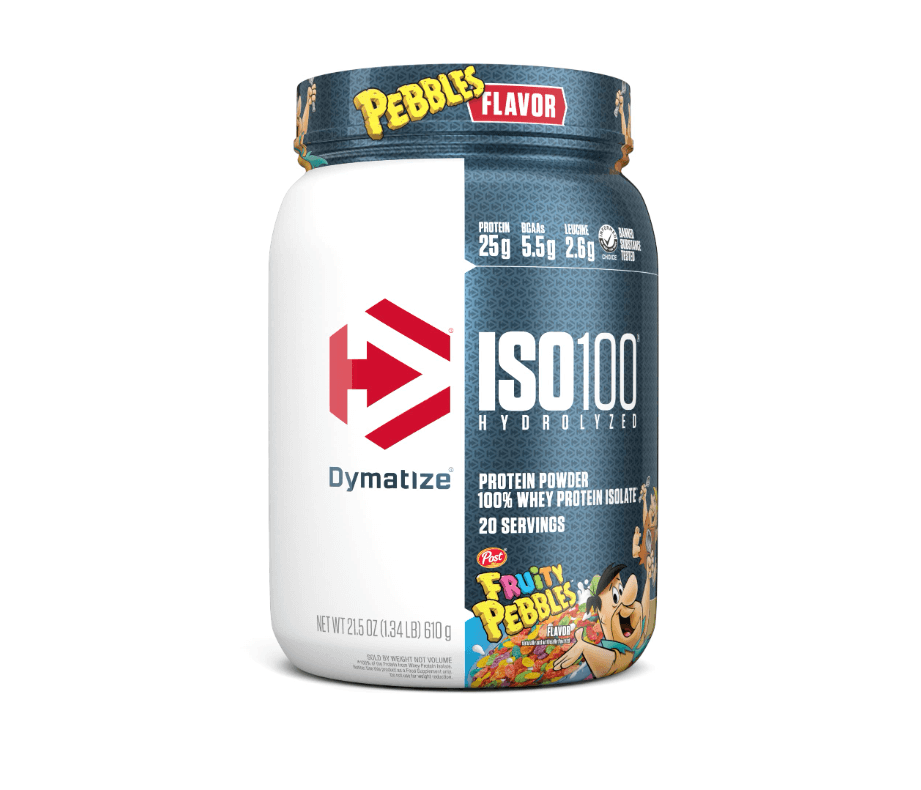
Pros
- Low in carbohydrates, fat, and sugar
- Hydrolyzed proteins for fast absorption
- Contains 5.5 grams of BCAAs that help with muscle growth
- Each flavor is quite enjoyable and full of natural ingredients
Cons
- Containers may not be full to the brim
- Includes both sucralose and stevia
Key Specs
| Protein Source | Whey Protein Isolate |
| Flavors | 6 |
| Calories Per Scoop | 120 |
| Protein Per Serving | 25g |
Why It’s Great
The hydrolyzed proteins in this particular product are derived from whey protein isolate, through a process of breaking down the bonds between the amino acids. This yields a digestible form of protein that’s much easier to absorb, thanks to the smaller peptide chains that it forms. These molecules are quickly taken up by the bloodstream through a simple process of digestion. That means you can expect to feel the effects of the protein quickly, allowing you to maintain a high level of performance. It doesn’t feel heavy in the stomach either, so you won’t have to worry about any digestive discomfort.
It also has a good balance of essential ingredients, with 5.5 grams of branched-chain amino acids (BCAAs) per serving. These molecules help with muscle growth and energy, making them a valuable addition to any supplement. Among the notable BCAAs are leucine, isoleucine, and valine; all of which are important for maintaining normal body functions. The first one helps with muscle growth and development, while the other two are involved in sustained energy and muscle repair.
Moreover, the solubility and flavor of this product are quite good, with each scoop delivering a palatable blend of natural ingredients for a pleasant experience. It easily dissolves into a thin and light mixture that doesn’t dilute the formula, and each flavor is quite tasty. Despite the fact that it contains sucralose and stevia, these two sweeteners are used in moderation so as not to overpower the taste. Even though the containers aren’t always full to the brim, they still represent one of the most affordable and effective whey protein powders on the market.
Who It’s Best For
If you’re on the lookout for affordable protein powder supplements that deliver on their promise, then the Dymatize ISO100 Hydrolyzed Protein Powder is a superb option. It has a balanced mix of hydrolyzed proteins and BCAAs that help with muscle growth and energy, a great taste, and it’s quite reasonably priced. The specific combination of ingredients makes it suitable for all kinds of athletes, from weightlifters to those taking up running as a hobby. It’s also great for those on the go who need a protein boost before or after a workout, such as busy professionals with an active lifestyle.
A Step-by-Step Guide to Choosing the Right Whey Protein Powder
In the realm of fitness and nutrition, whey protein powder has become a staple for many people who are striving to meet their protein needs. Whether you’re an athlete looking to build muscle, someone aiming to improve their overall health, or just seeking a convenient source of protein, we’re here to unravel the mysteries, decode the labels, and empower you to make an informed choice that suits your unique needs and goals.
What Is Whey Protein?
Whey protein is a high-quality protein derived from milk during the cheese-making process. It is a complete protein, meaning it contains all essential amino acids required for various bodily functions, including muscle growth and repair. Whey protein is renowned for its rapid absorption, making it an ideal choice for post-workout recovery and muscle building.
Types of Whey Protein
Whey Protein Concentrate (WPC) contains varying amounts of protein (usually around 70-80%) and retains some fats and carbohydrates. It’s known for its excellent taste and affordability, making it a popular choice for those on a budget.
Whey Protein Isolate (WPI) is processed to remove most of the fats and carbohydrates, resulting in a product that is about 90% protein. It’s preferred for those looking for a higher protein content without excess calories or lactose.
Whey Protein Hydrolysate (WPH) is pre-digested, meaning it undergoes partial hydrolysis to break down protein into smaller peptides. This makes it easier to digest and less likely to cause allergies. It’s often used in medical protein supplements and infant formulas.
Factors to Consider When Buying Whey Protein Powder
- Protein Content – The protein content varies between types of whey protein. If you’re looking for a higher protein-to-calorie ratio, opt for WPI or WPH. WPC is still a good choice but contains slightly less protein.
- Ingredients – Check the ingredient list for additives, fillers, or artificial sweeteners. Ideally, choose a whey protein powder with minimal ingredients and no unnecessary additives.
- Flavor and Taste – Taste preferences vary from person to person. Most brands offer a variety of flavors, so you can choose one that suits your palate. Keep in mind that some flavors may contain added sugars or artificial flavorings.
- Allergens – If you have lactose intolerance or milk allergies, look for whey protein isolate or hydrolysate, as they have reduced lactose content. Always check the product label for allergen warnings.
- Brand Reputation – Choose a reputable brand with a history of producing high-quality whey protein products. Read reviews and check for certifications such as Good Manufacturing Practices (GMP) to ensure product quality.
- Price – Whey protein prices can vary significantly. While cost is a factor, don’t compromise quality for a lower price. Consider the protein content per serving to determine the best value.
- Purpose – Consider your fitness or health goals. If you’re using whey protein for post-workout recovery, a fast-absorbing isolate might be ideal. For general protein supplementation, concentrate or isolate can work.
- Serving Size and Macros – Look at the serving size and macronutrient profile per serving. Ensure it aligns with your dietary and calorie requirements.
- Third-Party Testing – Some brands submit their products to third-party testing for quality and purity. Look for whey protein powders with certifications from organizations like NSF or Informed Choice.
Common Misconceptions About Whey Protein
Whey protein is undoubtedly a popular and highly regarded nutritional supplement, known for its numerous health benefits and muscle-building properties. However, like many widely-used products, it’s not immune to misconceptions and myths that can lead to confusion about its true value and purpose.
Misconception 1: Whey Protein Is Only for Bodybuilders
One of the most pervasive myths is that whey protein is exclusively for bodybuilders or professional athletes. While it’s true that many in the fitness industry utilize whey protein to support muscle growth and recovery, this supplement is not limited to them. Whey protein is a convenient and efficient source of high-quality protein that can benefit a wide range of individuals, including those seeking weight management, enhanced overall nutrition, or simply looking to increase their daily protein intake.
Misconception 2: Whey Protein Leads to Bulking Up
The fear of “bulking up” is a common concern, especially among women, when considering whey protein supplementation. However, the reality is that building substantial muscle mass requires a comprehensive approach that includes a tailored workout program, consistent strength training, and a precise diet with a caloric surplus. Whey protein alone will not lead to bulky muscles; it is an aid for muscle recovery and development when combined with a well-structured fitness plan.
Misconception 3: All Whey Proteins Are the Same
Not all whey proteins are created equal. There are various types of whey protein, including whey protein concentrate, isolate, and hydrolysate, each with its unique composition and benefits. Whey protein isolate, for instance, contains a higher percentage of protein with minimal fats and lactose, making it an excellent choice for those with lactose intolerance or seeking a leaner protein source. Understanding the differences between these types of whey protein will help you choose the one that aligns with your specific dietary requirements and goals.
Misconception 4: Whey Protein Is Only for Post-Workout
While whey protein is commonly consumed post-workout to aid in muscle recovery, it’s not limited to this timeframe. Protein is essential for various bodily functions, and whey protein can be consumed at any time of the day to meet your daily protein needs. It can serve as a convenient snack, a component of a balanced meal, or an ingredient in recipes like protein pancakes or smoothies. The key is to incorporate it into your daily diet to support overall nutrition.
Misconception 5: Whey Protein Is Harmful to Kidneys
There is a misconception that consuming high amounts of protein, including whey protein, can be harmful to kidney health. In reality, numerous studies have shown that protein intake within recommended daily ranges is not harmful to individuals with healthy kidneys. However, if you have pre-existing kidney issues or other medical conditions, it’s essential to consult with a healthcare professional for personalized dietary guidance.
Misconception 6: Whey Protein Is Only for Younger People
Whey protein is often associated with younger, more active individuals. However, older adults can benefit significantly from whey protein supplementation. As we age, maintaining muscle mass and strength becomes increasingly important for overall health and functional independence. Whey protein can be a valuable tool in preserving muscle mass, promoting recovery, and supporting active aging.
Misconception 7: Whey Protein Is a “Magic” Weight Loss Solution
While whey protein can support weight loss efforts, it’s not a magical solution for shedding pounds on its own. Weight loss results from a combination of factors, including a caloric deficit, a balanced diet, regular physical activity, and healthy lifestyle choices. Whey protein can aid in weight management by promoting feelings of fullness, preserving lean muscle mass during calorie restriction, and assisting with recovery after workouts. However, it should be part of a comprehensive weight loss plan, not a standalone solution.
How to Add Whey Protein Powder to Your Diet
Incorporating whey protein powder into your food regimen is a great way to increase your protein intake, support muscle growth and recovery, and enhance the nutritional value of your meals. Here are some creative and delicious ways to add whey protein powder to your diet.
Protein Shakes and Smoothies
Blend one scoop of whey protein powder with water, milk (dairy or plant-based), or a liquid of your choice. Add fruits (e.g., berries, bananas), vegetables (e.g., spinach, kale), and other ingredients like Greek yogurt, nut butter, or honey for a nutritious and satisfying shake or smoothie.
Protein Pancakes or Waffles
Mix whey protein powder into your pancake or waffle batter to create protein-packed breakfast treats. Combine with eggs, flour, and a bit of baking powder, and cook as usual.
Oatmeal or Cereal
Stir a scoop of whey protein powder into your morning oatmeal or cereal to boost protein content. Add your favorite toppings such as nuts, seeds, and fruits for extra flavor and nutrition.
Protein Bars or Energy Bites
Create homemade protein bars or energy bites by mixing whey protein powder with ingredients like rolled oats, nut butter, honey, and dried fruits. Shape the mixture into bars or bite-sized balls, refrigerate, and enjoy as a convenient snack.
Baking
Enhance the protein content of baked goods by substituting a portion of the flour with whey protein powder. You can use it in recipes for muffins, cookies, brownies, and more.
Protein Coffee or Tea
Add a scoop of whey protein powder to your morning coffee or tea for a protein-infused beverage. Blend it with a small amount of liquid first to avoid clumping.
Salad Dressings
Create a creamy and protein-rich salad dressing by mixing whey protein powder with Greek yogurt, olive oil, lemon juice, and your favorite seasonings. Drizzle it over salads for added flavor and protein.
Soups and Sauces
Thicken soups or sauces with whey protein powder to boost their protein content. Simply whisk the powder into the liquid until well combined.
Yogurt or Cottage Cheese
Sprinkle whey protein powder over a bowl of yogurt or cottage cheese for an easy and protein-rich snack. Top with fruits, nuts, or honey for added flavor.
Protein Ice Cream
Blend whey protein powder with frozen bananas or other fruits to create a creamy and nutritious protein ice cream. Customize the flavors by adding cocoa powder, vanilla extract, or spices like cinnamon.
Homemade Protein Popsicles
Mix whey protein powder with fruit puree or yogurt, pour the mixture into popsicle molds, and freeze for a refreshing and protein-packed summer treat.
Protein-Rich Sauces
Incorporate whey protein powder into savory sauces, such as pasta sauce or stir-fry sauces, to increase their protein content without altering the taste significantly.
High-Protein Breading
Combine whey protein powder with your preferred seasonings to create a high-protein breading for chicken, fish, or tofu. Coat your protein source with the mixture before cooking for a protein-packed meal.
Nutritional Boost
Whenever you prepare a meal, consider adding a scoop of whey protein powder to increase the overall protein content without changing the dish’s flavor noticeably.
Adjust the amount of whey protein powder according to your protein requirements and personal taste preferences. Experiment with different recipes and combinations to discover the flavors and textures you enjoy the most.
10 Compelling Benefits of Whey Protein Powder
In the realm of fitness and nutrition, whey protein powder has emerged as a superstar supplement. But what exactly makes whey protein powder so popular, and what benefits can it offer beyond muscle building?
High-Quality Protein Source
Protein is the cornerstone of muscle growth, tissue repair, and overall health. Whey protein boasts one of the highest protein contents among all dietary sources. It’s rich in essential amino acids, which the body cannot produce on its own, making it an excellent choice for those looking to increase their protein intake.
Muscle Growth and Repair
Whey protein is packed with branched-chain amino acids (BCAAs), including leucine, which plays a pivotal role in muscle protein synthesis. By stimulating muscle growth and repair, whey protein helps individuals, from beginners to seasoned athletes, achieve their fitness goals. Post-workout consumption of whey protein can optimize recovery and muscle development.
Weight Management
Protein has a unique ability to promote feelings of fullness and satiety. Incorporating whey protein into your diet can help control your appetite and reduce overall calorie consumption. Moreover, the thermic effect of protein means that your body expends more energy to digest it, aiding in weight management and fat loss efforts.
Supports Immune Function
Whey protein contains immunoglobulins, lactoferrin, and other immune-boosting compounds. These components can enhance your body’s defense mechanisms, bolstering your immune system. Regular consumption of whey protein can contribute to overall well-being and better resistance to illness.
Enhances Antioxidant Activity
Whey protein contains the amino acid cysteine, a precursor to the powerful antioxidant glutathione. This antioxidant plays a crucial role in protecting cells from oxidative damage caused by free radicals. By supporting glutathione production, whey protein can help combat oxidative stress and reduce the risk of chronic diseases.
Improved Nutrient Absorption
Whey protein is essential for the absorption of vital nutrients like vitamins and minerals. By ensuring adequate protein intake through sources like whey protein powder, you can optimize the absorption of these nutrients, enhancing their overall effectiveness.
Maintains Lean Body Mass During Caloric Deficits
When you’re on a calorie-restricted diet to lose weight, your body may break down muscle tissue for energy. Whey protein can act as a safeguard by preserving lean muscle mass while encouraging the body to utilize stored fat for energy. This makes it a valuable tool for those seeking to lose weight without losing muscle.
Lower Blood Pressure
Some studies suggest that incorporating whey protein into your diet may lead to modest reductions in blood pressure, particularly in individuals with elevated levels. While it’s not a substitute for medical treatment, it’s encouraging to see how dietary choices can positively impact cardiovascular health.
Optimal Recovery and Performance
For athletes and fitness enthusiasts, rapid recovery between workouts is crucial for consistent training and improved performance. The quick absorption of whey protein provides muscles with the necessary amino acids, reducing post-exercise soreness and fatigue. This, in turn, allows for more frequent and effective training sessions.
Convenient and Versatile
Whey protein is easy to prepare and can be consumed in various forms, such as shakes, and smoothies, or added to recipes like pancakes and oatmeal. This versatility makes it a practical option for individuals with busy lifestyles.
Frequently Asked Questions:
Is 100% whey protein best?
100% whey protein is an excellent choice for those looking for a pure and high-quality protein source. It contains minimal fats and carbohydrates, making it a great option for post-workout recovery and muscle building. However, the “best” protein powder depends on your dietary preferences and goals. Whey protein concentrate, isolate, and hydrolysate all have their unique advantages and are suitable for different purposes.
What is the most anabolic protein?
Whey protein is often considered one of the most anabolic proteins due to its rich amino acid profile, especially its high content of branched-chain amino acids (BCAAs). BCAAs, particularly leucine, play a crucial role in stimulating muscle protein synthesis, making whey protein an effective choice for promoting muscle growth and repair.
What is the most effective protein powder on the market?
The effectiveness of a protein powder can vary based on your goals and preferences. Several protein powders are highly regarded in the market, including whey protein, casein protein, and plant-based options like pea or rice protein. The “most effective” protein powder depends on your specific needs, such as muscle building, weight management, or dietary restrictions. Choose a product from a reputable brand that aligns with your goals and dietary preferences.
How much protein do I need daily?
The recommended daily protein intake varies depending on factors like age, gender, activity level, and goals. As a general guideline, most adults should aim to consume between 0.8 to 1.2 grams of protein per kilogram of body weight per day. For those engaged in regular physical activity or strength training, higher protein intake within this range may be beneficial for muscle growth and recovery. Consult with a healthcare provider or registered dietitian to determine your specific protein needs based on your individual circumstances.



